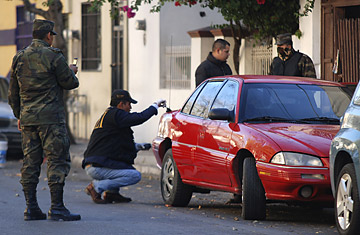
Soldiers and police examine a car related to an attack on the offices of Televisa in Monterrey, Mexico
Editors at Televisa, the world's most popular Spanish-language network, were having a lively news meeting in the northern Mexico city of Monterrey when they heard a series of pops followed by a thunderous explosion. Running outside, the editors realized the top breaking news item had come straight to them. The pops were bullets sprayed from Kalashnikov automatic rifles directly into the façade of their offices. The blast was from a fragmentation grenade. Next to the debris was a message scrawled on cardboard: "Stop just broadcasting us. Also broadcast the narco politicians," it said.
The Jan. 6 assault on Televisa's offices was the latest in a series of attacks on Mexico's media as the nation writhes in an orgy of drug-related bloodshed. Out of a record 5,300 deaths from beheadings, assassinations and massacres last year, eight of them were murdered Mexican journalists, making Mexico the most dangerous country for their trade in the hemisphere. Furthermore, many reporters in cities on the front lines of the drug war say they are systematically threatened, beaten and offered bribes because of their coverage of organized crime. (See pictures of the war on crime in Mexico City.)
But even by such appalling standards, the Televisa attack stood out in the way the assailants so blatantly tried to dictate the coverage of Mexico's television giant, which is probably the most powerful media organization south of the Rio Grande. Earning about 75% of Mexico's broadcast advertising, Televisa has long had an overwhelming influence on the nation's political life. Presidents, lobbyists and rising politicians all fight hard for space on its nightly noticiero, which regularly breaks leading stories. "Televisa has the equivalent political clout of ABC, NBC and CBS combined," says Mexican media investigator Raul Trejo. "When the narcos threaten this organization, they are showing they see no limits in their power."
Counting revenues of some $3.5 billion a year, Televisa is headed by Emilio Azcarraga Jean, 40, who inherited the empire from his father Emilio Azcarraga Milmo, who was known as "El Tigre" because of his white-streaked hair and fierce character. The network catapulted onto the world stage by exporting its steamy telenovelas, which have been translated into more than 50 languages from Korean to Romanian. Critics lambasted the network for giving uncritical support to the government during decades of one-party rule. However, since the advent of multiparty democracy in 2000, Televisa has given fairly equal airtime to competing candidates.
In the past year, Televisa has broadcast daily coverage of the drug war, filming scenes of corpses, firefights and arrests amid the battles between trafficking warlords and government forces. However, it has not led any groundbreaking exposés on the cartel empires or their networks of political corruption. "We do not hold back from reporting anything. But at the same time, we do not do detective work because we are not policemen," says Francisco Cobos, news editor at Televisa Monterrey, who witnessed the Jan. 6 blasts.
Televisa has also resisted showing the messages that the cartels write or print on blankets, which are strewn over bridges and hung on public walls as part of their campaign of terrorism. Known as narco mantas (capes), many messages in recent months have accused the administration of President Felipe Calderón of working with the Sinaloa cartel based on Mexico's Pacific Coast. Monterrey is home to the rival Gulf cartel, which is believed to be behind many of these messages.
Soldiers and federal police guarded the Televisa offices in the days following the attack, while Mexican and international media organizations poured out condemnations and demanded the apprehension of the assailants. "Solving this attack will be a new test for the government, which wants to make it a federal crime to use violence against the press," said Paris-based Reporters Without Borders in a news release.
Cobos said there are no plans for Televisa to change its coverage. However, in a statement on television, he said staff will take more safety measures. "I think we will continue doing our job in the most efficient way possible but with the precautions that these types of messages [require us to take]," he said. "Men of organized crime, I want to tell you that we don't have anything against you. We are communicators. We are journalists. We are dedicated to informing, and as such, my colleagues don't want to be in the middle of these bullets."
